MOST SCIENCE FICTION IS IRRELIGIOUS — in most sci-fi stories, religion is simply not there. Some sci-fi novels, however, are implicitly or explicitly atheist: some have atheist characters, some revolve around the conflicts of atheists with religious believers and religious institutions, and — to make the definition even looser — some that I’d classify as atheist (more accurately, atheist related) simply critique religion and religious institutions.
The following books do not comprise anything approaching a complete list, even using that loose definition of atheist science fiction. They’re merely the best atheist and atheist-related sci-fi novels that I’ve come across.
I’m sure there are many other good atheist science fiction novels, and I’ll add them to the list as I discover them. If you have any favorites not listed here, please leave a comment about them. (All links in the listings below go to book reviews on this site.)
* * *
- The Handmaid’s Tale. (1985) More speculative social fiction than science fiction, The Handmaid’s Tale is Atwood’s horrifying vision of what would happen to America, and especially American women, if fundamentalists seized power. Anti-fundamentalist and antiauthoritarian, but not specifically atheist.
Atwood’s Maddaddam Trilogy is also well worth a read.
- Oryx and Crake (2003) bears not at all on religion, but rather on rapacious corporate capitalism and the evil uses to which it could put technological developments in the pursuit of profit.
- The Year of the Flood (2009) is set inside a believable, intricately described religious/ecological cult, and continues describing the socio-politico-economic problems carried over from Oryx and Crake.
- Maddaddam (2013) has still more on the matters dealt with in the first two books, but also looks at the extreme measures necessary to avoiding detection in an all-pervasive surveillance state. It also features biting and insightful passages regarding the sleaziness and hypocrisy of fundamentalist religion. All three books in the trilogy are masterfully written and quite entertaining.
Iain M. Banks
 The following are Banks’ “Culture” novels–space opera on a grand scale. While set in the same universe, all work as stand-alone novels. All are set in a galaxy-spanning, far-future atheist and anarchist society, where religion pops up only when there’s an “outbreak” of it somewhere. All of the Culture novels feature strong, believable characters (including AIs), complicated ethical dilemmas, and frequent dark humor. Of them, the two best are probably Player of Games and Surface Detail, and the weakest is probably The Hydrogen Sonata. The one that has the most to do with religion, revolving around the sheer viciousness of many religious believers, is Surface Detail; religious fanaticism and the ills it produces also features prominently in Consider Phlebas.
The following are Banks’ “Culture” novels–space opera on a grand scale. While set in the same universe, all work as stand-alone novels. All are set in a galaxy-spanning, far-future atheist and anarchist society, where religion pops up only when there’s an “outbreak” of it somewhere. All of the Culture novels feature strong, believable characters (including AIs), complicated ethical dilemmas, and frequent dark humor. Of them, the two best are probably Player of Games and Surface Detail, and the weakest is probably The Hydrogen Sonata. The one that has the most to do with religion, revolving around the sheer viciousness of many religious believers, is Surface Detail; religious fanaticism and the ills it produces also features prominently in Consider Phlebas.
- Consider Phlebas (1987)
- The Player of Games (1988)
- Use of Weapons (1990)
- Excession (1996)
- Inversions (1998)
- Look to Windward (2000)
- Matter (2008)
- Surface Detail (2010)
- The Hydrogen Sonata (2012)
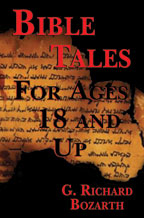
G. Richard Bozarth
- Bible Tales for Ages 18 and Up (2014). A very funny, very revealing retelling of well known stories from one of the original, though unevenly written and poorly plotted, fantasy novels. (Full disclosure: See Sharp Press published this one.)
John Brunner
- The Crucible of Time (1983). An inspiring novel about the rise of science and its eventual triumph over religion in an alien society.
Mick Farren
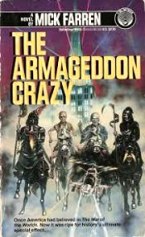 Protectorate (1985). Deals with cults in the context of authoritarian government. Not one of Farren’s better novels, but worth reading if you can find a copy for a buck or two.
Protectorate (1985). Deals with cults in the context of authoritarian government. Not one of Farren’s better novels, but worth reading if you can find a copy for a buck or two.- Their Master’s War (1987). An entertaining page-turner concerning militarism, imperialism, and religious manipulation.
- The Armageddon Crazy (1989). An all too timely and at times quite funny novel about a fundamentalist takeover of the U.S. government. Probably Farren’s best sci-fi novel.
Tom Flynn
- Galactic Rapture (2000). Deals almost entirely with the harmful effects of religious belief, irrationality, and gullibility. The high points are the detailed descriptions of “psychic” scams.
James P. Hogan
 Code of the Lifemaker (1983). Very entertaining, very funny. A sharp look at a questioning attitude and rationality vs. credulousness and irrationality, with some sections exposing how “psychics” gull their victims. Probably the best sci-fi novel ever written about the conflict between science and religion, and definitely the funniest.
Code of the Lifemaker (1983). Very entertaining, very funny. A sharp look at a questioning attitude and rationality vs. credulousness and irrationality, with some sections exposing how “psychics” gull their victims. Probably the best sci-fi novel ever written about the conflict between science and religion, and definitely the funniest.- The Immortality Option (1995). The sequel to Code of the Lifemaker. Well worth reading, but only after reading Code of the Lifemaker. It’s almost as funny as its predecessor.
Victor Koman
- The Jehovah Contract (1987). A noir-comic — to use the current term, “urban fantasy” — novel about the conflict between good and evil, where good is personified as a hit man who has a contract to take out evil, personified as The Almighty.
Ken Macleod
- The Night Sessions (2008). A perceptive near-future look at the menace of religious fundamentalism.
- Intrusion (2012). A frighteningly plausible dystopian novel of an all-pervasive surveillance state. A modern 1984. The protagonists are both atheists, and the novel in part revolves around their conflicts with religious “nutters” and religious privilege.
- Blameless in Abaddon (1996). This is more fantasy than science fiction, but it’s worth including nonetheless. The second book in Morrow´s Godhead trilogy, Blameless in Abaddon revolves around the unstinting efforts of a terminally ill cancer patient to put God on trial at the Hague for crimes against humanity. It’s very dark, but very funny.
I’ve read the other two books in the trilogy, Towing Jehovah (1994) and The Eternal Footman (1999) and would not recommend them; fortunately, Blameless in Abaddon works as a stand-alone novel.
Morrow has written a number of other atheistic novels and story collections, such as Only Begotten Daughter (1990) and Bible Stories for Adults (1996); I wouldn’t recommend them for the same reason I wouldn’t recommend Towing Jehovah or Eternal Footman: they’re satires, but I didn’t find them funny. The one other book of Morrow’s I would recommend is the philosophically oriented City of Truth (1990), the first portion of which is downright hilarious.
- Blasphemy (2007). A cross between a near-future high-tech thriller and a Tony Hillerman mystery, Blasphemy features two strong, very well described fundamentalist-preacher characters, one a sleazy, wealthy televangelist (drawing on Jerry Falwell, Jimmy Swaggart, and Robert Schuler), the other a dirt poor, ignorant, vicious fanatic. If you like both thrillers and the Hillerman novels (set on the Navajo Reservation), you’ll probably love this one.
Kim Stanley Robinson
- Galileo’s Dream (2009). A well executed time-travel novel involving Galileo and his conflict with the Catholic Church and the Inquisition.
Norman Spinrad
- Mind Game (1980). Science fiction related but not science fiction, this is sci-fi author Spinrad’s insightful treatment of a barely disguised Church of Scientology, and one of the best novels about cults ever written
Charles Stross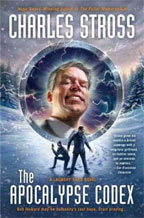
- The Apocalypse Codex (2012). An oftentimes funny, genre-bending (sci-fi/fantasy/horror) novel about a prominent televangelist, Christian fundamentalism, slithering necromantic horrors, and “applied computational demonology.” Although part of the Laundry Files series, this works as a stand-alone novel, though you’ll enjoy it more if you first read the previous highly entertaining books in the series; the first is The Atrocity Archives (2004).
- The Delirium Brief (2017). The primary characters from The Apocalypse Codex, and the related fundamentalist and necromantic monstrosities, reappear in this latest Laundry Files novel. There were two intervening novels in the series between these two, and it’d be a good idea to read The Apocalypse Codex before tackling The Delirium Brief; it’d be a better idea to read all of the prior Laundry Files books, as there are many references to events in the previous novels.
- Kalki (1978). A terrifying look at religious fanaticism and the use of biological WMDs.
- Live from Golgotha (1993). A short comic time-travel novel about live TV coverage of the crucifixion of J.C.
Robert Anton Wilson
- Schroedinger’s Cat Trilogy (1979). Definitely not for the easily offended — if this appeared today, the author would be drawn and quartered by PC zealots — but quite funny with many biting comments about religion.
Robert Charles Wilson
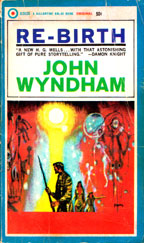 Mysterium (1994). A perceptive, well written novel about an alternate-reality American religious police state, and the casual arrogance, self-righteousness, callousness, intrusiveness, and brutality of those who run such religious states. Also deals with the evil of blindly following orders rather than following your own conscience.
Mysterium (1994). A perceptive, well written novel about an alternate-reality American religious police state, and the casual arrogance, self-righteousness, callousness, intrusiveness, and brutality of those who run such religious states. Also deals with the evil of blindly following orders rather than following your own conscience.
John Wyndham
- Re-Birth (1955). A nicely written early post-apocalyptic tale of religious ignorance, arrogance, and brutality, and escape from it.
* * *
Zeke Teflon, compiler of this list, is the author of Free Radicals: A Novel of Utopia and Dystopia, which deals in large part with religious and political cults.
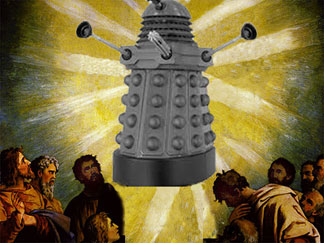
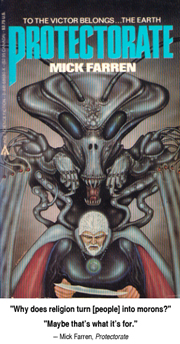

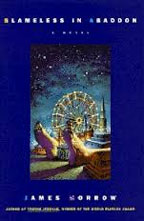
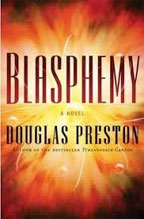
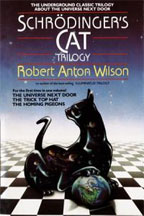
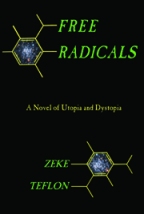
[…] Notable Atheist Science Fiction Novels […]
LikeLike
[…] Notable Atheist Science Fiction Novels […]
LikeLike
[…] Notable Atheist Science Fiction Novels […]
LikeLike
[…] Notable Atheist Science Fiction Novels (updated 2017) […]
LikeLike
[…] Notable Atheist Science Fiction Novels […]
LikeLike